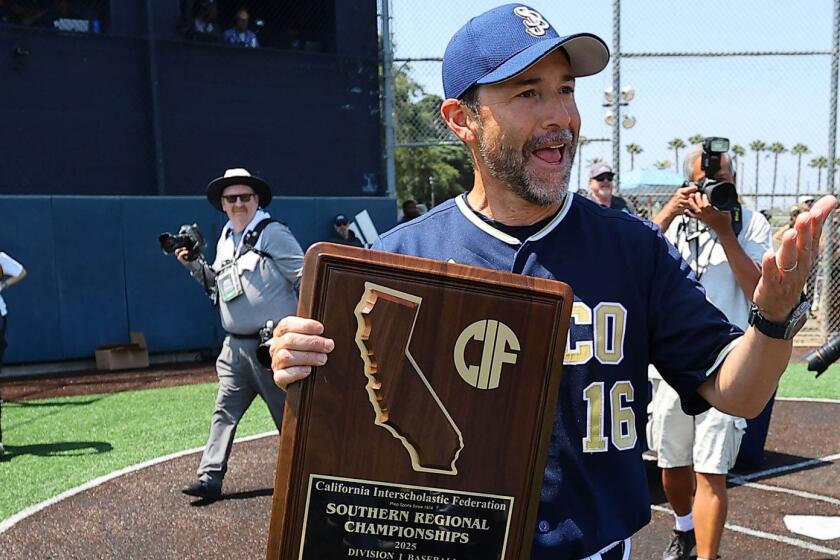Football officials could get headaches when enforcing new rule
- Share via
High school football referees will have increased responsibility when games begin early next month. They can now make the call whether a player should be removed because of concussion symptoms.
It’s a situation that could produce some uncomfortable moments.
“It’s going to be hard for officials,” said Steve Stearns, rules interpreter for the California Interscholastic Federation.
Imagine if a team’s star quarterback goes down and acts dizzy. If the referee decides the player should leave the game, the player would not be permitted to return.
A coach won’t be happy, but the referee has been given the authority to make that kind of judgment because of the dangers associated with concussions.
“It may put more pressure on officials, but that’s our job — to not only enforce the rules of the game but look out for the health and welfare of the players,” Stearns said. “The idea is not for officials to become those who diagnose concussions.”
The new rule was passed this summer by the National Federation of State High School Assns. The CIF made the rule more stringent by saying a player can’t return to the game and must be cleared by a doctor to return to the next game or practice.
Long-time trainer Tim Moscicki from Los Angeles Loyola said, “A lot of us are concerned kids are going to stop telling us they have headaches because they’re afraid you’re going to take them out.”
Doctors and trainers are still considered the first line of defense, but if an official observes concussion symptoms such as confusion, dizziness or poor balance, he’s expected to act. Officials previously had authority to remove players for injury only when they had been knocked unconscious.
“There’s no such thing as a minor concussion,” said Roger Blake, the CIF’s associate executive director.
Steve Strimling, instructional chairman for the California Football Officials Assn., said he has been advising officials about how to invoke the rule.
“We are going to go to the head coach and inform him the player has been removed for concussion symptoms,” he said. “We’re going to write it down and file a report. We’ve asked each official to send a report to the local unit.”
Strimling said officials will not become doctors on the field.
“If a kid goes down in our area and we see those symptoms, we can make a determination,” he said. “We’re not going to get into the middle of an injury timeout and start asking questions. Those symptoms have to be clear and obvious. If medical people get to players prior to us, it’s going to be their decision.”
Blake said officials have been told to “error on the side of safety when you make the decision.”
But some coaches have expressed apprehension about officials taking on a doctor-like role.
“I don’t know if I like it,” Huntington Beach Edison Coach Dave White said. “We have real good doctors and trainers.”
Stearns said he is concerned about those officials who don’t like to remain invisible and say, “I’m in charge. I know what to do. I want to be the star of the show.”
But he said his greater concern is the “official who hangs back and is afraid to pull the trigger.”
“I would rather have a coach ticked off at me having to remove a star quarterback,” Stearns said, “than six months later have to face the family in a court room.”
eric.sondheimer@latimes.com
More to Read
Get our high school sports newsletter
Prep Rally is devoted to the SoCal high school sports experience, bringing you scores, stories and a behind-the-scenes look at what makes prep sports so popular.
You may occasionally receive promotional content from the Los Angeles Times.







